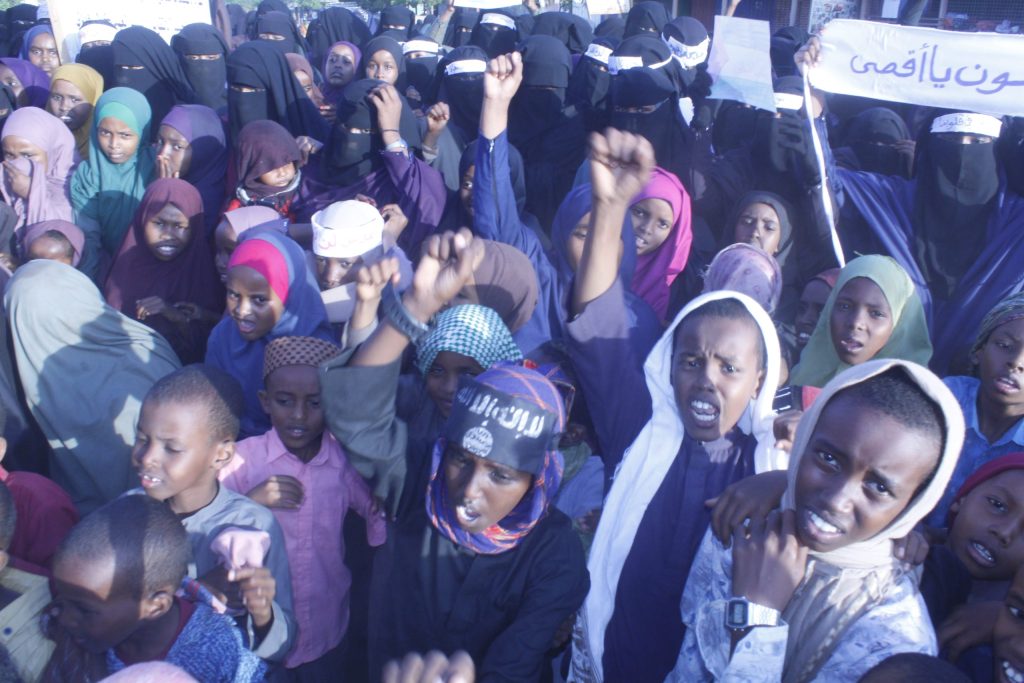ADF STAFF
It only took a matter of days for the Somali terror group al-Shabaab to congratulate Hamas for its deadly October 7 attack on Israel.
Al-Shabaab, a branch of al-Qaida, gathered hundreds of supporters on October 15 for pro-Hamas protests in its southern Somalia strongholds, Jilib and Kunya Barrow.
Men burned Israel’s flag, and several Shabaab-affiliated clan officials spoke in front of a banner that read: “We are One Ummah [worldwide Islamic community].”
Experts say al-Shabaab is using its assets on the ground, on radio and in social media to connect itself to Gaza to co-opt attention, expand and bolster its recruiting efforts.
Caleb Weiss, senior analyst at the Bridgeway Foundation charitable organization and founder of the Long War Journal website, said the rallies in Somalia were al-Shabaab’s attempt to tie the Israeli-Palestinian conflict into the “global jihad.”
“Al-Shabaab has routinely attempted to place itself within the same context as the Israel-Palestine conflict, as has al-Qaida in general,” he told ADF. “It helps to mobilize supporters or new recruits both locally and globally by tapping into the anger and vitriol that the conflict invariably produces.”
The Somali government declared “total war” against the extremist group in August 2022 and has launched multiple military offenses to try to take back large swaths of central and southern Somalia.
Somali Prime Minister Hamza Abdi Barre said al-Shabaab uses social media to spread a barrage of propaganda.
“They are using advanced platforms of social media, namely Telegram and Tik Tok and other platforms,” he said in an interview with Al Jazeera on September 16. “We believe that many of al-Shabaab operatives are using aliases in order to spread their vicious and dangerous ideology across our country.
“Our youth are peaceful, unarmed and innocent, and they are being subjected to a high tide of ideological warfare.”
This is not the first time al-Shabaab has inserted itself into the Israel-Palestine conflict. It previously claimed that its deadly 2019 attack on a hotel and office complex in Nairobi, Kenya, was a response to international recognition of Jerusalem as the capital of Israel.
Nairobi-based researcher Georgia Gilroy said social media influencers play a central role in al-Shabaab’s operations.
In an October 31 analysis for the Global Network on Extremism & Technology’s website, she examined how al-Shabaab’s media networks quickly pivoted to sharing pro-Hamas content and portrayed Hamas as their “brothers.”
“By intertwining al-Shabaab rhetoric with Palestinian grievances, and drawing parallels between Hamas’ fight and al-Shabaab’s fight, the group stands a legitimate chance of pivoting towards a more internationally based audience, while also growing its sympathy among Somali populations in East Africa,” Gilroy wrote.
Terrorism researcher Alta Grobbelaar also has detailed how al-Shabaab latches on to conflicts thousands of kilometers away from Somalia and designs its messages to target specific audiences.
“Al-Shabaab has discovered the secret to success in this century — relevance,” she wrote in the January 2023 edition of the academic journal Insight on Africa. “By using the media available to them to their advantage, they have proven that decreased numbers and territory do not equal decreased capabilities and, even less so, decreased media coverage.”

